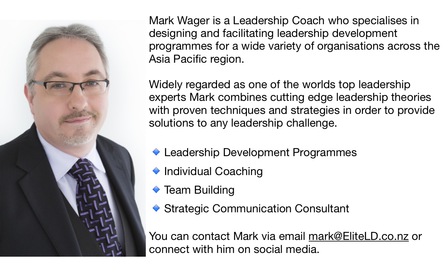Leadership Lessons From The All Blacks
Leadership Lessons From The All Blacks
By Mark Wager
One of the most consistently successful teams in sports history is the New Zealand national rugby team, the All Blacks. Ever since their first game in 1903 they have maintained a winning percentage of over 76% with three World Cup victories including the last two tournaments in 2011 and 2015.
Businesses, regardless of their field are all searching for success. They want to beat the competition and come out on top yet they often fail and when they do they list the usual suspects for their failure. We never had enough resources, we never had the right people these are just some of the most common excuses I hear from companies, yet the All Blacks win and win year after year and they don't have the largest resources. A country with a population of four million consistently outperforms countries with much larger populations and resources. The All Blacks have had great players but so have other countries. Players come and players go yet the All Blacks consistently find players to replace players that seemed irreplaceable. So what makes the All Blacks the most successful team in history?
Leadership is what can turn a good team into a successful team and turn a successful team into a legacy. The All Blacks apply strong leadership principles in order to create an environment that doesn't allow its young players to be crushed under the weight of a country's expectation but instead uses that expectation to lift the players to a level that they never imagined possible. These leadership principles are not exclusive to the rugby field but can be applied in any organisation or business. An exploration of these core All Black principles can show everyone how to achieve ongoing success as a team.
Leadership principle: Leadership is a collective endeavour
Leadership is not a position it's an attitude. While a person may be influenced by someone with a title they are influenced far more by someone who has personal qualities that people admire and the expertise to succeed. The All Blacks recognise this so there's no single leader within the team. Yes, there is a Captain but the team is driven by a leadership group. A selection of players who understand that being a leader is a decision, have decided to lead by example and take the responsibility of holding their colleagues to a standard of performance and behaviour that the world expects of the All Blacks.
Leadership principle: Successful teams are not rebuilt they are reestablished
Recently two of the greatest players of all time Richie McCaw and Dan Carter have retired from the All Blacks, along with several other experienced first team players. For any team it would seem like they would have to restart over but that is not the mentality of the All Blacks. At a recent press conference, Coach Steve Hansen said, "Our mindset is not one of re-building, but re-establishing; moving to a higher level," he said. "That's our challenge - to take this team to a higher level from where we left after the Rugby World Cup." The All Blacks understand that success never ends. To be successful year after year you have to move forward regardless of who leaves. Evolution is the key to effective leadership.
Leadership principle: Good teams are made up of good people
The All Blacks have a philosophy that better people make better players so they invest resources and time on working on the character of the players to ensure they develop the necessary personal characteristics which enable them to interact with, contribute to and influence positively to the overall team culture. This is so important to the All Blacks that the character of the player is a vital ingredient of the selection process. There have been many good players who never had a career with the All Blacks because they never had the necessary character to put the needs of the team ahead of their own.
Leadership principle: Give people a purpose greater than themselves
Every player that puts on the famous black jersey acknowledges that the jersey doesn't belong to them, they are instead a custodian of the jersey with an obligation to respect those who have gone before them and a commitment to leave the jersey in a better state for those who will follow them. The All Blacks understand that people have a fundamental desire to be part of something greater than themselves. It's a desire that is so powerful that people will override their own instinctual behaviours and adopt the behaviours of the team culture that has this greater purpose. When the players enter the field they know they are not just representing the All Blacks but they are representing what the All Blacks stand for.
I have delivered leadership programmes for businesses in different industries and regardless of whether they are a television station, architects, a hospital, a school or a rugby team the same principles of leadership apply. As long as teams consist of people, it takes the same principles to inspire people to greatness. This fundamentally remains the same and where we see greatness we can find lessons that can help us achieve our own level of success.
Leadership workshops designed by Mark Wager

Posted: Thursday 9 June 2016

